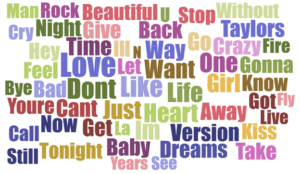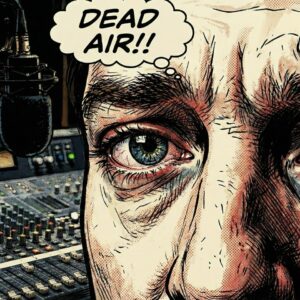In the kNOW: Where We Stand and How We Keep Standing!

There’s a LOT going on right now. Which means there’s plenty to weigh on people’s minds. And hopefully, we’ve all found ways to cope with the stress and anxiety that comes with worry. But with all the different current issues on the local, state, national and global stages happening, we were curious, “What do people REALLY care about?” And how do we cope with stress? We surveyed nearly 1,200 Americans, aged 18 to 64, to understand better what’s most important to us and what we rely on to cope with stress and anxiety.
We didn’t want to simply provide a long list of current issues in the news and have people ‘rank’ them on how important they are to them. First, we’re always interested in getting “derived” importance, rather than “stated,” whenever we can. Secondly, our lists were long; 24 Current Issues in the News and 28 Dependencies (Coping Mechanisms), to be exact. We’ve been using MaxDiff for years -when it’s appropriate- to best understand what’s most important to people. MaxDiff is a trade-off technique that eliminates scale bias, presents respondents with simpler choices, shortens survey time by eliminating the need for repetitively rating multiple different factors using scales, provides greater discrimination within the results, and much more. (Happy to chat about the pros and cons of any research technique! Just shoot us a note at tellmemore@nuvoodoo.com.)
To set the stage, the first thing we’ll share is our lists.
The full list of Current Issues in the News tested:
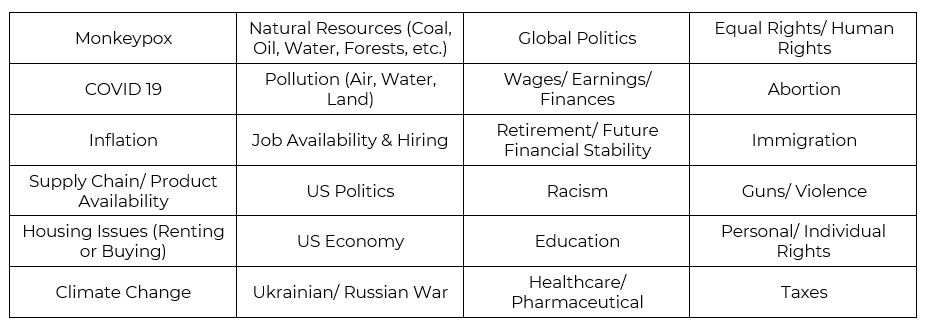
The full list of Dependencies in Times of Stress tested:
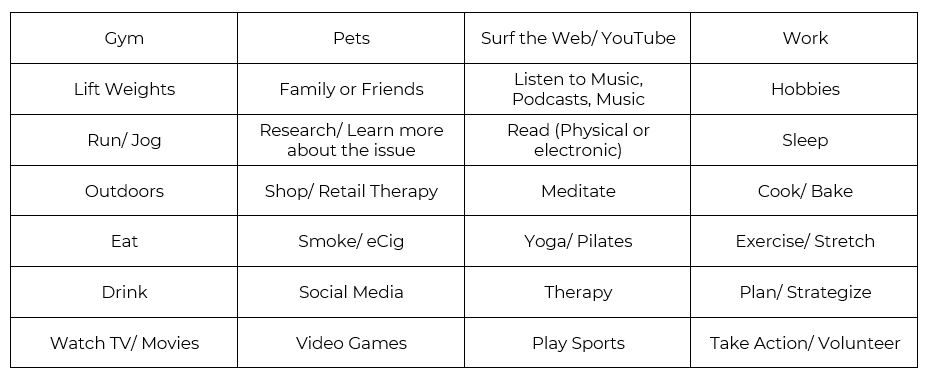
Using MaxDiff best practice, for each list, respondents saw 6 questions, each with a group of 4 randomly selected options. The Current Issues in the News question asked, “Of the four options below, pick the one that is MOST important to you personally and pick the one that is LEAST important to you.” The Dependencies question asked, “Of the four options below, pick the one that you personally, MOST depend on/ use and pick the one that you LEAST depend on/use in times of stress/ anxiety.”
Our results were largely what we expected, but there were some surprises.
The most important current issues for total respondents were the US Economy, Inflation, and Wages/ Earnings/ Finances. This isn’t altogether surprising since murmurings of a recession have plagued our ears for months now. Likewise, rising prices for goods, coupled with rising interest rates -the likes of which we haven’t seen in a decade- make all things money a key worry for us all.
Further, in a long list of issues like Housing, Taxes, Education, Disease (COVID), and War (Ukrainian/ Russian War), the #4 and #5 most important current issues were ‘Equal Rights/ Human Rights’ and ‘Personal/ Individual Rights’, respectively. Whether this is surprising or not, depends on your point of view. We have a theory. In truth, this long list of Current Issues in the News was originally much longer. We had to cut it down to make it more manageable. One way to do that was to make the issues “neutral”. For example, instead of including both Gun Rights and Gun Regulation, we listed Guns/ Violence. Instead of including both Pro-Life and Women’s Health Care and Reproductive Rights, we listed Abortion. Plus, Abortion was the specific issue in the news at the time. Looking at the results now, we theorize that when respondents didn’t see, for example, “Pro-Life” or “Gun Regulation”, specifically, they decided to project and collect their personal stances on many of the social issues into ‘Equal Rights/ Human Rights’ and/ or ‘Personal/ Individual Rights’.
Guns/ Violence (#6), Healthcare/ Pharmaceutical (#7), Education (#8), Natural Resources (#9), and Housing Issues (#10) finish out the top ten.
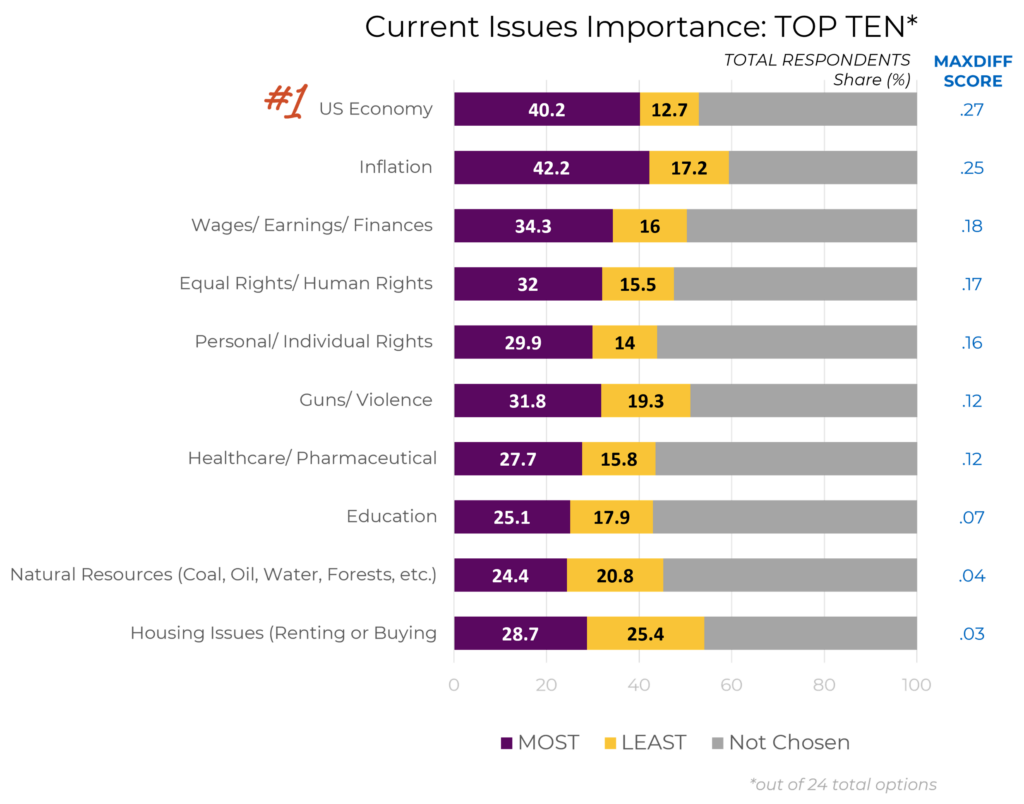
Least important to respondents was Racism, Abortion, Pollution, Climate Change, and Covid 19. Hmmm. That’s interesting.
It should be noted, that while our survey did only include those aged 18 to 64, it was otherwise generally balanced and representative across Gender, Race, Income, Political Affiliation, and Geographic location. So, there’s not one big group skewing the results.
Perhaps it’s not that these issues aren’t important, but that we’re fatigued from how much media and political attention they’ve received of late. Or maybe, when there’s just only so much room for worry, we must focus most on the things that impact us, personally, right NOW.
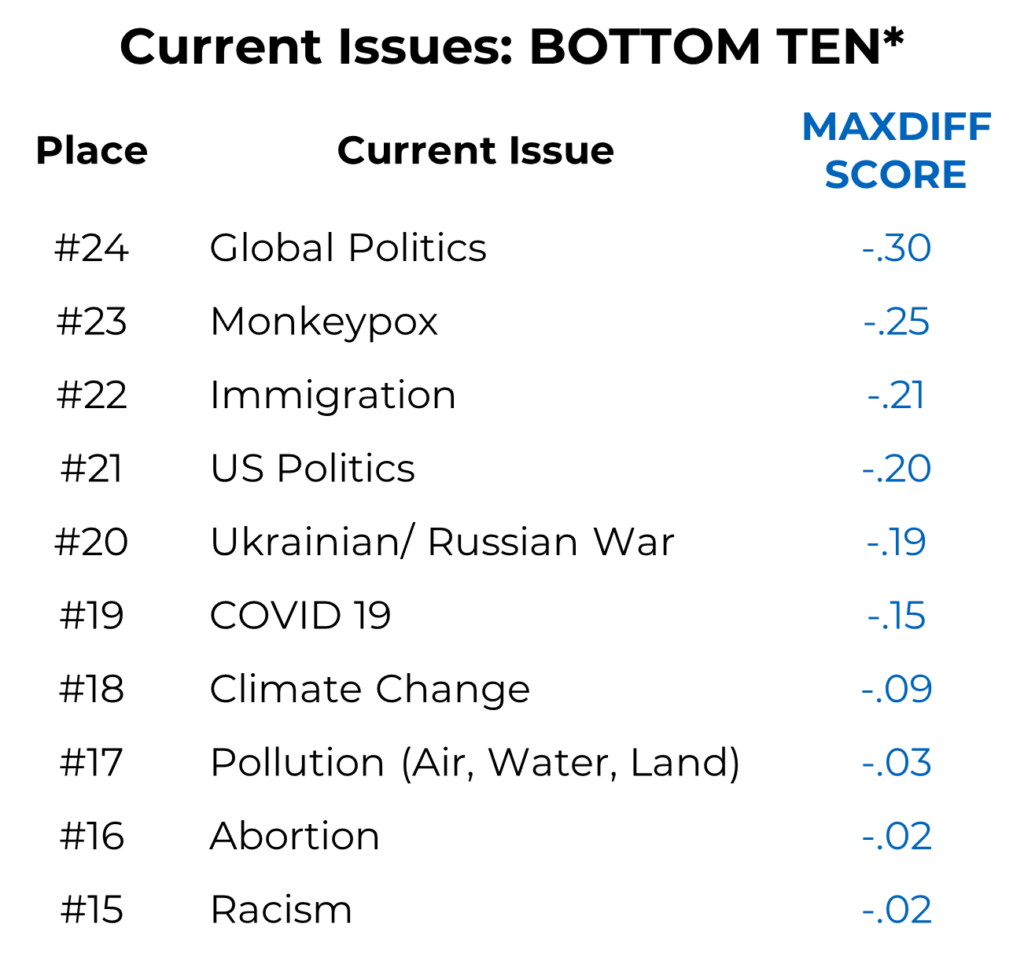
The priorities of current issues shifted a bit when looking by different target audiences (i.e. Women, Non-White, Gen Z, Nuclear Families, etc.). For ‘Men’, Job Availability & Hiring (#8) and Taxes (#10) joined their top ten list. Abortion made an appearance at #9 for ‘Women’ and #5 for ‘Very and Somewhat Liberal’ participants. Climate Change only made it into the top ten (#9) for ‘Very and Somewhat Liberal’ participants. For those participants who identified ‘Very and Somewhat Conservative’, Supply Chain/ Product Availability (#4), Retirement/ Future Financial Stability (#5) and Taxes (#7) joined their top ten.
Both ‘Non-white’ and ‘Very and Somewhat Liberal’ respondents’ #1 current issue of importance was Equal Rights/ Human Rights and #2 was Guns/ Violence. Gen Z’s most important current issue was also Equal Rights/ Human Rights, but their #2 was Racism. Those living in ‘Major US Cities’ listed Housing Issues (Renting or Buying) #2 – the highest placement by any target audience. Education placed the highest, fourth, among ‘Nuclear Families’ and still broke the top ten (#9) among those living ‘Alone’ or ‘With a spouse/partner’ only.
While WHAT is important to us may vary, how we manage our stress and anxiety is quite similar. Most of us rely on Family or Friends (#1) and Sleep (#2) as our top ways to manage. We also Listen to Music, Podcasts (#3), Eat (#4), and rely on Pets (#5). Rounding out the top ten are: Watch TV/ Movies (#6), Hobbies (#7), Outdoors (#8), Exercise/ Stretch (#9) and Cook/ Bake (#10). (I wonder if Cook/ Bake would have cracked the Top Ten, Pre-Pandemic?)
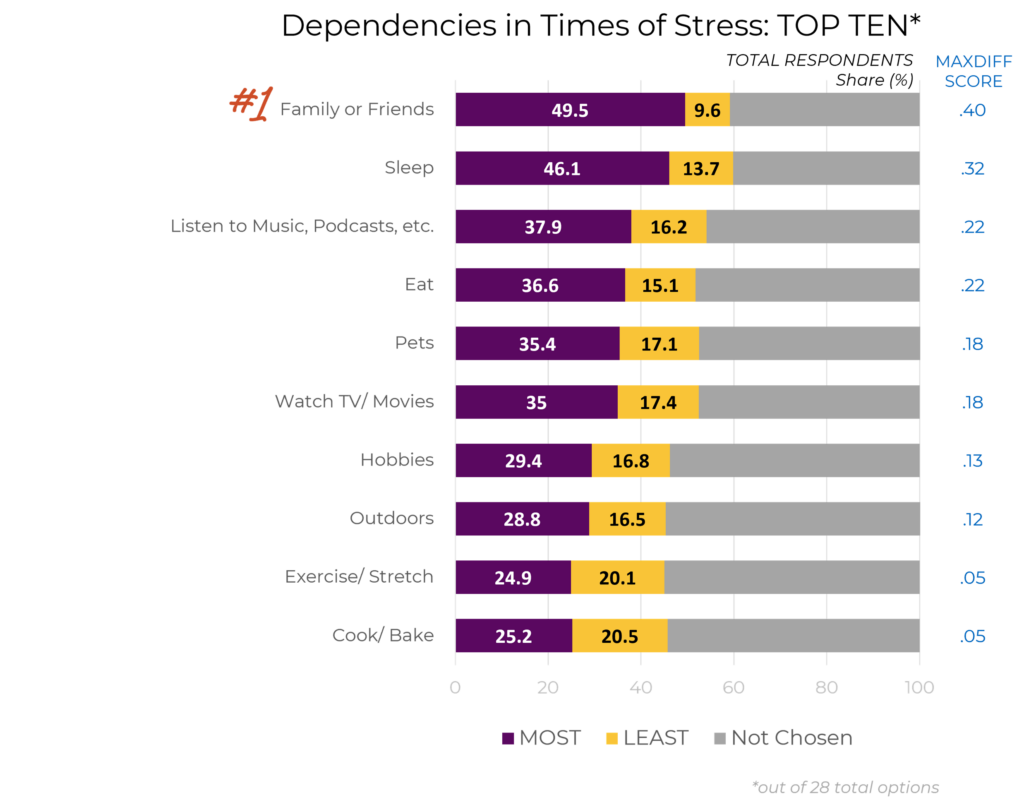
When it comes to what we rely on LEAST in times of stress and anxiety – it’s a mixed bag of both good and bad. Many at the bottom of the list would actually be great for stress and anxiety, like Yoga/ Pilates (#28), Lifting Weights (#26), Playing Sports (#25), the Gym (#24), Running/ Jogging (#23), Taking Action/ Volunteering (#20) and Therapy (#19). Others at the bottom of the list are arguably where they should be, like Smoking/ eCig (#27).
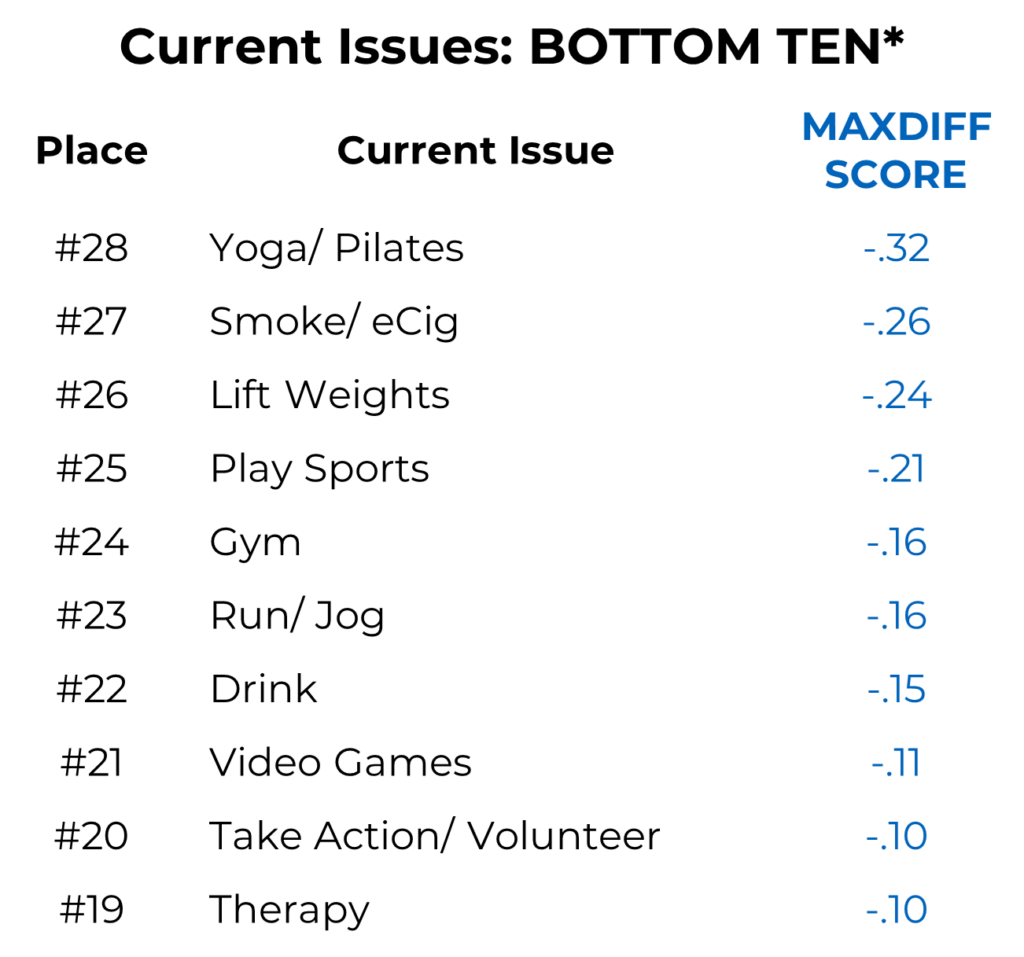
While the list looks very similar across target audiences (i.e. Women, Non-White, Gen Z, Nuclear Families, etc.) there were a few shifts in priority for some. Gen Z, those living in Major US Cities, and Non-Whites prioritized Sleep as #1 and Family or Friends as #2. Pets rose to #3 for those 50 and older.
The most notable re-shuffle of dependency rank occurred in Americans with household incomes of $140K or more. While their #1 was still Family or Friends, the rest of their Top Ten looked like this: #2 Exercise/ Stretch, #3 Hobbies, #4 Watch TV/ Movies, #5 Pets, #6 List to Music, Podcasts, etc., #7 Read, #8 Sleep, #9 Work and #10 Research/ Learn more about the issue. Maybe these folks are on to something – when stressed, get moving, read, do the work, do the research and learn more about what’s ailing you.
As always, if you’d like to discuss a custom, holistic research strategy for your business or brand, feel free to contact us.
Our ‘In the kNOW’ series tackles the burning questions we all want to know about right NOW. If you have questions you think we should ask, topics we should explore, things you’d like to learn more about, shoot me a note at tellmemore@nuvoodoo.com.

